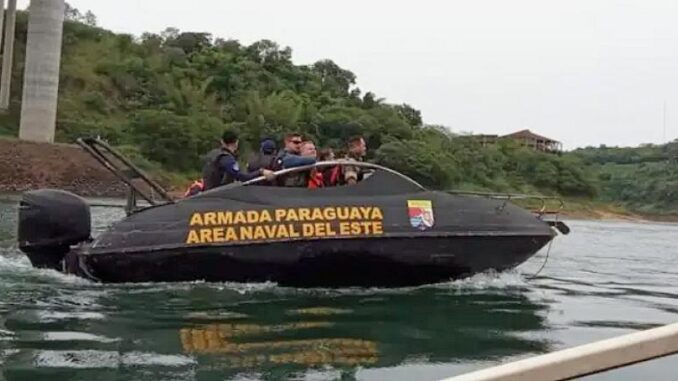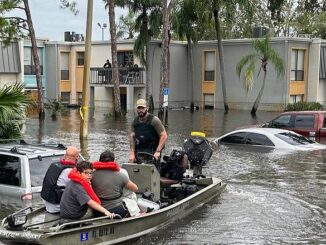
BUENOS AIRES, Argentina, January 6, 2025 (ENS) – Authorities in Paraguay have arrested 26 individuals, and they have identified two criminal networks and 12 companies suspected of illegal deforestation and the trafficking of native tree species from the South American country.
Led by Paraguay and coordinated by the international police force Interpol, Operation Panthera Onca, carried out from October 14-19, 2024, focused on the tri-national region where the borders of Argentina, Brazil, and Paraguay converge. The region’s strategic location and economic activity make it a hotspot for both legal commerce and illicit networks.
“Illegal deforestation encompasses a broad spectrum of criminal activities, from document fraud to money laundering and corruption. This operation highlights the urgent need for continued multi-agency and sustained cross-border cooperation to tackle the criminal networks devastating our environment for profit,” Kat Henn, Interpol’s assistant director of environmental security, said.
A total of 28 different criminal offenses were detected during the operation, which involved targeted checks and inspections at land borders, surveillance of waterways and aerial monitoring of forests by helicopter and satellite.
Additionally, the subject of an Interpol Red Notice for fraud was arrested and extradited to Brazil. Another man was returned to Brazil to serve a 15-year prison sentence for drug and arms trafficking.
At least 100 officers and 14 different agencies took part in the two-week Operation Panthera Onca effort, ensuring coordination between law enforcement and regulatory authorities.
Organizations such as the Paraguayan Navy, National Police, Public Prosecutor’s Office and Ministry of the Environment and Sustainable Development participated by monitoring forest areas and patrolling the waters of the Paraná River.
Officials seized 1,000 logs and 250 posts of quebracho wood (Schinopsis balansae), prized for its density and high tannin content. This hardwood tree, known as willow-leaf red quebracho, forms forests in the subtropical Humid Chaco ecoregion of north-eastern Argentina, and Paraguay, and is also found in the wild Pantanal vegetation of Brazil.
The three participating countries – Argentina, Brazil and Paraguay – are building their long-term capacity to fight forestry crime.
Operation Panthera Onca refers to the scientific name of the jaguar (Panthera onca), a feline apex predator present in the three countries. The jaguar is listed as Near Threatened by the Red List of Threatened Species compiled and maintained by the International Union for the Conservation of Nature, IUCN.
As part of the preparatory phase, Interpol organized case coordination meetings between the three countries to share satellite imagery and intelligence on high-value targets, known hotspots, trafficking routes, data on timber shipments and suspected links with other countries and regions.
The operation was preceded by a joint mentoring session by Interpol and the United Nations Office on Drugs and Crime on timber sampling and identification for 40 of the Paraguayan officers involved in the operational deployment.
Specialized instructors from Brazil, Argentina, and Paraguay trained the frontline officers, enhancing their skills to better detect and respond to forestry-related crimes in the field.
“This operation seeks to reduce the impact of forestry crimes and reinforce control in the most vulnerable areas of the region, contributing to the protection of the country’s natural resources,” the Paraguayan government stated in a bulletin sent to media.
On the Paraná River, the entire stretch between the Itaipu power plant, the International Friendship Bridge, the Integration Bridge, the mouth of the Monday River and the Moisés Bertoni Natural Monument, south of Presidente Franco, was inspected.
In addition to the immediate results, the institutions participating in the operation are mapping potentially vulnerable locations, with the aim of guiding future actions to combat environmental crimes.
“Environmental criminals pose a grave threat to our everyday lives, our planet and to future generations. Borders do not restrict environmental crimes, which range from ivory trafficking and overfishing of protected species, to illegal logging and the dumping of hazardous waste,” Interpol explains.
“The same routes used to smuggle wildlife across countries and continents are often used to traffic weapons, drugs and people. Indeed, environmental crime often occurs hand in hand with other offences such as passport fraud, corruption, money laundering and even murder,” Interpol states.
Unlike the illegal trade in drugs and other illicit goods, natural resources are finite and cannot be replenished in a lab. As such, there is a sense of urgency to combat environmental crime.
Operation Panthera Onca was delivered under the framework of project LEAP, funded by Norway’s International Climate and Forests Initiative to €6.3 million, with additional support from the U.S. Forest Service.
Launched in 2018, LEAP has assisted member countries to better detect, investigate and prevent forestry crime. LEAP promotes collaboration among law enforcement agencies across the globe, building a foundation for sustainability and efficiency.
Featured image: Paraguayan Navy boat under the Integration Bridge, near the meeting point between the Paraná and Iguaçu rivers. 2024 (Photo courtesy Paraguayan Navy)
© 2025, Environment News Service. All rights reserved. Content may be quoted only with proper attribution and a direct link to the original article. Full reproduction is prohibited.



